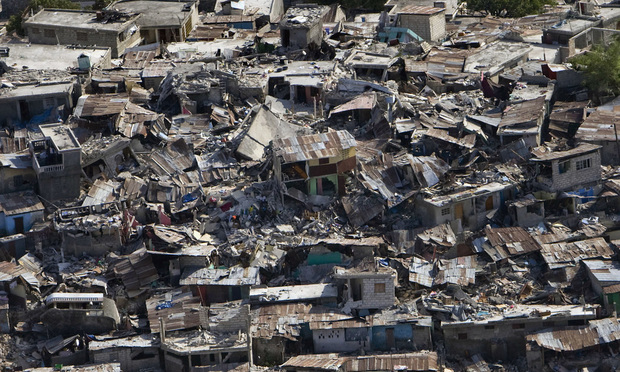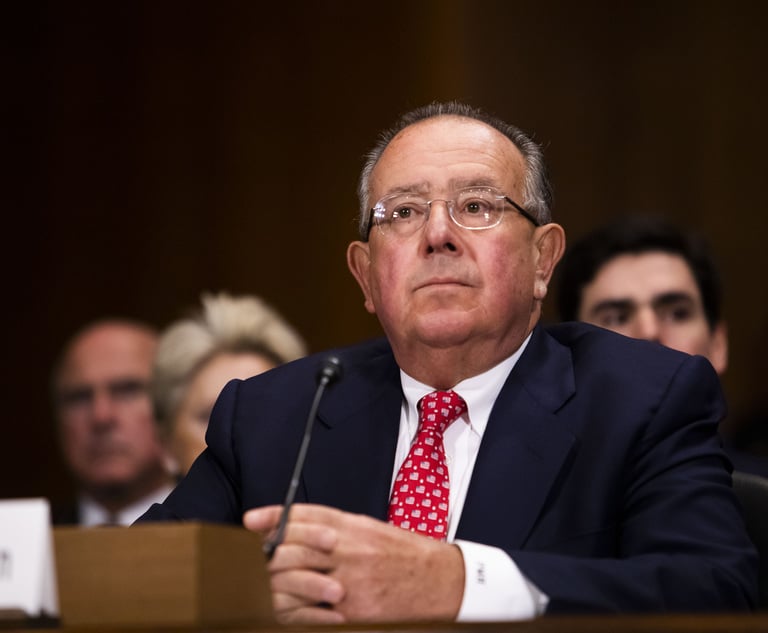Official Broke Law in Curbing Protections for Haitian Immigrants, Ex-Agency Head Says
The director of U.S. Citizenship and Immigration Services violated the law by disregarding dangerous conditions in Haiti when recommending the termination of temporary protected status for refugees who fled the country following a devastating 2010 earthquake, the director's predecessor told a federal judge at a Brooklyn trial testing the Trump administration's decision.
January 08, 2019 at 06:31 PM
4 minute read
 A neighborhood shows the damage after an earthquake measuring 7 plus on the Richter scale rocked Port au Prince Haiti just before 5 p.m. Jan. 12, 2010. Photo: UN Photo/Logan Abassi/United Nations Development Programme via Wikimedia Commons.
A neighborhood shows the damage after an earthquake measuring 7 plus on the Richter scale rocked Port au Prince Haiti just before 5 p.m. Jan. 12, 2010. Photo: UN Photo/Logan Abassi/United Nations Development Programme via Wikimedia Commons.
The director of U.S. Citizenship and Immigration Services violated the law by disregarding dangerous conditions in Haiti when recommending the termination of temporary protected status for refugees who fled the country following a devastating 2010 earthquake, the director's predecessor told a federal judge at a Brooklyn trial testing the Trump administration's decision.
Leon Rodriguez, a partner at Seyfarth Shaw who served as USCIS director from 2014 to 2017, told U.S. District Judge William Kuntz II of the Eastern District of New York that the law governing temporary protected status (TPS) requires that officials consider persistent ills that continue to affect Haiti, such as ongoing threats to public safety and food shortages, when assessing whether or not Haitian refugees should continue to receive protected status.
But in his recommendation to then-Acting Homeland Security Secretary Elaine Duke to terminate TPS, Rodriguez's successor as USCIS director, L. Francis Cissna, said Haiti had largely bounced back from the 2010 earthquake—which killed more than 200,000 people, according to some estimates—and that ongoing problems in Haiti like food insecurity and gender-based violence are unrelated to the earthquake.
“It violated the law in that it is a pretty serious misconstruction of the statute,” Rodriguez said of Cissna's recommendation.
Rodriguez made the remarks during questions from Ira Kurzban of Kurzban Kurzban Tetzeli & Pratt, who is part of the team of attorneys representing advocacy groups for Haitian refugees, as well as several of the more-than 50,000 Haitians who were granted TPS in the aftermath of the earthquake.
Plaintiffs' attorneys are squaring off with Assistant U.S. Attorneys Joseph Marutollo and James Cho of the Eastern District in a bench trial before Kuntz, the first trial to challenge the termination of TPS for Haitian refugees.
In November 2017, Homeland Security issued a news release in which Duke said that the “extraordinary yet temporary” conditions caused by the 2010 earthquake were no longer present, and thus TPS would be terminated for Haitian refugees, effective this upcoming July.
Just days before Homeland Security published notice of the termination in the federal register, in January 2018, news outlets reported that President Donald Trump expressed frustration in a closed-door meeting that the U.S. is taking on immigrants from “shithole” countries like Haiti and some African nations.
The New York Times also reported in 2017 that Trump said during a meeting in the Oval Office about immigration that people from Haiti “all have AIDS.”
Plaintiffs in the lawsuit challenging the TPS termination for Haitian refugees allege that the policy change was driven by Trump's racial animus, which is the basis for the due process claim contained in their suit.
Government attorneys deny that race had anything to do with the decision to end TPS for Haitian immigrants.
But the plaintiffs are also fighting the federal government on a more bureaucratic front: they allege that government officials violated the Administrative Procedure Act by abandoning well-established practice for reviewing TPS and took a narrow focus on the triggering event that caused Haitians to flee their country rather than the full spectrum of conditions that may affect the refugees' ability to safely return home.
The New York case is one of five from around the country challenging the TPS termination. In October, U.S. District Judge Edward Chen of the Northern District of California granted a temporary injunction to block the Trump Administration's plans to end TPS from Haitian immigrants, as well as people from El Salvador, Nicaragua and Sudan.
Read more:
Judge Rules State AGs ACA Lawsuit May Proceed Despite Government Shutdown
Lawsuit Looks to Preserve Protections for Immigrants From Haiti, El Salvador
NAACP Sues Homeland Security Over Haiti Immigration Policy
This content has been archived. It is available through our partners, LexisNexis® and Bloomberg Law.
To view this content, please continue to their sites.
Not a Lexis Subscriber?
Subscribe Now
Not a Bloomberg Law Subscriber?
Subscribe Now
NOT FOR REPRINT
© 2025 ALM Global, LLC, All Rights Reserved. Request academic re-use from www.copyright.com. All other uses, submit a request to [email protected]. For more information visit Asset & Logo Licensing.
You Might Like
View All
Decision of the Day: Judge Rules Brutality Claims Against Hudson Valley Police Officer to Proceed to Trial

Skadden and Steptoe, Defending Amex GBT, Blasts Biden DOJ's Antitrust Lawsuit Over Merger Proposal
4 minute read
Read the Document: DOJ Releases Ex-Special Counsel's Report Explaining Trump Prosecutions
3 minute read
Trending Stories
- 1Pa. High Court: Concrete Proof Not Needed to Weigh Grounds for Preliminary Injunction Order
- 2'Something Else Is Coming': DOGE Established, but With Limited Scope
- 3Polsinelli Picks Up Corporate Health Care Partner From Greenberg Traurig in LA
- 4Kirkland Lands in Phila., but Rate Pressure May Limit the High-Flying Firm's Growth Prospects
- 5Davis Wright Tremaine Turns to Gen AI To Teach Its Associates Legal Writing
Who Got The Work
J. Brugh Lower of Gibbons has entered an appearance for industrial equipment supplier Devco Corporation in a pending trademark infringement lawsuit. The suit, accusing the defendant of selling knock-off Graco products, was filed Dec. 18 in New Jersey District Court by Rivkin Radler on behalf of Graco Inc. and Graco Minnesota. The case, assigned to U.S. District Judge Zahid N. Quraishi, is 3:24-cv-11294, Graco Inc. et al v. Devco Corporation.
Who Got The Work
Rebecca Maller-Stein and Kent A. Yalowitz of Arnold & Porter Kaye Scholer have entered their appearances for Hanaco Venture Capital and its executives, Lior Prosor and David Frankel, in a pending securities lawsuit. The action, filed on Dec. 24 in New York Southern District Court by Zell, Aron & Co. on behalf of Goldeneye Advisors, accuses the defendants of negligently and fraudulently managing the plaintiff's $1 million investment. The case, assigned to U.S. District Judge Vernon S. Broderick, is 1:24-cv-09918, Goldeneye Advisors, LLC v. Hanaco Venture Capital, Ltd. et al.
Who Got The Work
Attorneys from A&O Shearman has stepped in as defense counsel for Toronto-Dominion Bank and other defendants in a pending securities class action. The suit, filed Dec. 11 in New York Southern District Court by Bleichmar Fonti & Auld, accuses the defendants of concealing the bank's 'pervasive' deficiencies in regards to its compliance with the Bank Secrecy Act and the quality of its anti-money laundering controls. The case, assigned to U.S. District Judge Arun Subramanian, is 1:24-cv-09445, Gonzalez v. The Toronto-Dominion Bank et al.
Who Got The Work
Crown Castle International, a Pennsylvania company providing shared communications infrastructure, has turned to Luke D. Wolf of Gordon Rees Scully Mansukhani to fend off a pending breach-of-contract lawsuit. The court action, filed Nov. 25 in Michigan Eastern District Court by Hooper Hathaway PC on behalf of The Town Residences LLC, accuses Crown Castle of failing to transfer approximately $30,000 in utility payments from T-Mobile in breach of a roof-top lease and assignment agreement. The case, assigned to U.S. District Judge Susan K. Declercq, is 2:24-cv-13131, The Town Residences LLC v. T-Mobile US, Inc. et al.
Who Got The Work
Wilfred P. Coronato and Daniel M. Schwartz of McCarter & English have stepped in as defense counsel to Electrolux Home Products Inc. in a pending product liability lawsuit. The court action, filed Nov. 26 in New York Eastern District Court by Poulos Lopiccolo PC and Nagel Rice LLP on behalf of David Stern, alleges that the defendant's refrigerators’ drawers and shelving repeatedly break and fall apart within months after purchase. The case, assigned to U.S. District Judge Joan M. Azrack, is 2:24-cv-08204, Stern v. Electrolux Home Products, Inc.
Featured Firms
Law Offices of Gary Martin Hays & Associates, P.C.
(470) 294-1674
Law Offices of Mark E. Salomone
(857) 444-6468
Smith & Hassler
(713) 739-1250






